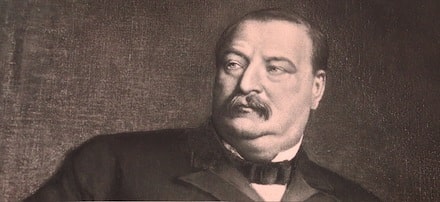
During the Tuesday episode of the Ron Paul Liberty Report, host Ron Paul answered questions that viewers had submitted. In the process of answering one of the questions, Paul mentioned that there was an instance in which President Grover Cleveland, who Paul has praised before, stood up against congressional pressure for the United States to go to war.
While Paul did not go into details about the instance when mentioning it in his answer, what Cleveland did was refuse to go to war with Spain in the name of aiding an insurrection in Cuba.
Historian Henry F. Graff briefly addressed the matter in a Miller Institute article regarding Cleveland’s foreign policy. Graff wrote:
In Cuba, Cleveland wanted to remain neutral, refusing to support the insurrection against Spanish rule and urging instead that Spain adopt reforms that would lead to gradual independence. On this issue, he stood in opposition to the Senate, which had adopted resolutions urging Cleveland to recognize the belligerency of the Cuban rebels. Congress then moved to defy the President by threatening to recognize Cuban independence. Cleveland responded flatly, saying he would characterize any such resolution as a usurpation of presidential authority. The matter remained unresolved at the end of his second term.
Ivan Eland ranks Cleveland second-best among American presidents in in his insightful book Recarving Rushmore: Ranking the Presidents on Peace, Prosperity, and Liberty. Eland provided in his book this additional information:
In 1896, Cleveland — unlike his successor William McKinley — resisted congressional and public pressure for interventionism by avoiding war with Spain over the rebellion in Cuba against its empire. Cleveland could have profited politically from such a war — because it would have taken the American public’s mind off the economic downturns of the 1890s — but he instead bore the substantial costs of doing the right thing.
As Eland suggests, things were very different after McKinley in 1897 followed Cleveland in the White House. In 1898, McKinley brought the US into the Spanish-American War that serves as a good marker of when the US transitioned into being an empire.
Yale Professor William Graham Sumner captured well the importance of the Spanish-American War in transforming the nature of America and its government in his “The Conquest of the United States by Spain” that he presented soon after the war’s conclusion. Sumner began his speech, which still today is important for helping understand the nature of interventionist foreign policy, by laying out his thesis that the US in winning the Spanish-American War was moving down an imperialist path that threatened “ruin” for America:
During the last year the public has been familiarized with descriptions of Spain and of Spanish methods of doing things until the name of Spain has become a symbol for a certain well-defined set of notions and policies. On the other hand, the name of the United States has always been, for all of us, a symbol for a state of things, a set of ideas and traditions, a group of views about social and political affairs.
Spain was the first, for a long time the greatest, of the modern imperialistic states. The United States, by its historical origin, its traditions, and its principles, is the chief representative of the revolt and reaction against that kind of a state. I intend to show that, by the line of action now proposed to us, which we call expansion and imperialism, we are throwing away some of the most important elements of the American symbol and are adopting some of the most important elements of the Spanish symbol.
We have beaten Spain in a military conflict, but we are submitting to be conquered by her on the field of ideas and policies. Expansionism and imperialism are nothing but the old philosophies of national prosperity which have brought Spain to where she now is. Those philosophies appeal to national vanity and national cupidity. They are seductive, especially upon the first view and the most superficial judgment, and therefore it cannot be denied that they are very strong for popular effect. They are delusions, and they will lead us to ruin unless we are hardheaded enough to resist them. In any case the year 1898 is a great landmark in the history of the United States.
In the 125 years since the Spanish-American War, the imperial path taken by McKinley — in contrast with Cleveland’s exercise of restraint — has been chosen many more times by US presidents.

